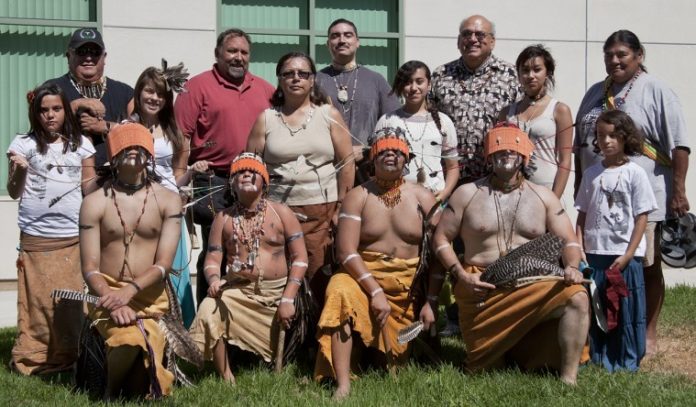
A landmark event for a local Native American tribe whose roots to this area track back nearly 3,000 years is approaching Saturday, when Bishop Richard Garcia of the Monterey Diocese will offer a mass of reconciliation at the San Juan Bautista Mission and “apologize for the tragic events which occurred during mission times.”
Principally associated with Mission San Juan Bautista and the surrounding areas of Hollister and Gilroy, the Amah-Mutsun Tribal Band occupied the San Juan Valley “long before the Spanish arrived in the late 1700s,” as noted on the tribe’s website. The indigenous peoples were subjected to a subservient existence beneath the Spanish Catholic regime when European colonization of the Pacific coast began in the 1770s.
Saturday’s reconciliation ceremony – held during the time of winter solstice – signals an important day of prayer, renewal and hope for the future of the Mutsun people, according to Tribal Chairman Valentin Lopez.
“Our tribe has experienced severe trauma throughout the history of settlement in California. Forced relocations to missions, bounties on the heads of Native Americans, rape, disease, slavery, cultural genocide, broken treaties and the continuing denial of our history perpetuates the effects of historic trauma on our citizens,” he said, in an official press release from the tribe. “These events, which nearly destroyed the Mutsun culture, have never been officially acknowledged by the Catholic Church. We view this Mass of Reconciliation as a very important step along the path of healing for Amah-Mutsun, both individually, as many of our citizens are Catholic to this day, and collectively as a people, accepting our past, celebrating our resilience and looking to a vibrant future.”
The event will commence at 10:15 a.m. and include a presentation of an official resolution that acknowledges the Amah-Mutsun Tribal Band as the historic and continuous tribe belonging to the area.
The present day Mutsun band is comprised of the documented descendants of the Native Americans who were taken to Missions San Juan Bautista and Santa Cruz during European colonization. Decades later in 1930, the Federal government terminated its relationship with the Mutsun – an act which, to this day, has yet to be rectified, according to the tribe.
“Because of their lack of Federal status, the tribe currently has no land,” the press release states. “Few citizens can afford to live in the area of their ancestors. Many reside in Central Valley communities and will be traveling significant distances for this historic event.”
Most recently in June, the City of San Juan Bautista issued a formal proclamation recognizing the current-day tribe as “the historic and continuous Amah-Mutsun Ohlone Tribe that existed before Spanish contact.”
Historical unpleasantries such as widespread diseases, death and the destruction of the Mutsun’s sacred landmarks by Spanish soldiers, have been somewhat glossed over, or for the most part “ignored” by the mission, the state park and the city, according to Lopez.
“That’s one of the big things,” he asserted back in June. “Insisting our story be told.”
He was echoed by tribe member Eleanor Castro from Fresno, who said she was looking forward to the reconciliation ceremony.
Acknowledging that “we belong here, and that we were wronged” is a major step in the right direction, she previously said.
In its press release, the tribe also expressed gratitude to Bishop Garcia for “offering apologies from the Church and for this mass of reconciliation.”
“We have a tragic history, but we don’t dwell on the tragic history,” noted Lopez, addressing City Council back in June. “We look to the future.”
A traditional Mutsun dance will take place at 11:30 a.m. Saturday on the grassy quad area in front of the mission, located in the historic Spanish Plaza at 406 Second St. in San Juan Bautista The public is welcomed to observe; limited seating for the mass inside the mission sanctuary will be available.









